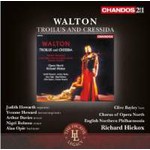
Walton: Troilus & Cressida (Complete Opera)
 $40.00
Out of Stock
$40.00
Out of Stock6+ weeks add to cart
WILLIAM WALTON
Walton: Troilus & Cressida (Complete Opera)
Alan Opie (baritone) Judith Howarth (soprano) Arthur Davies (tenor) / English Northern Philharmonia, Richard Hickox
[ Chandos 241 / 2 CD ]
Release Date: Sunday 10 August 2014
This item is currently out of stock. It may take 6 or more weeks to obtain from when you place your order as this is a specialist product.
Edward Greenfield wrote in Gramophone that 'even among Chandos' many bold achievements over the years, this magnificent set of Troilus and Cressida stands out... [Hickox's] expressive warmth is matched by his understanding of Walton's fiery side, with magnificent performances form the entire cast'.
Troilus and Cressida, William Walton's first opera was commissioned by the BBC in 1947 although only after seven years, in 1954, did the premiere take place, in Covent Garden. For a revival in 1976, Walton removed about thirty minutes of music and adapted the soprano part of Cressida to bring it within the range of the mezzo-soprano Dame Janet Baker. The version recorded here follows Walton's more concise score whilst returning the part of Cressida to its original soprano register.
Based on Chaucer's classic love-tale Troilus and Criseyde, the opera represents Walton's desire to engage with traditional operatic themes. Walton wanted to write a romantic, 'Pucciniesque' opera and the rich scoring and many memorable melodies certainly invite comparison.
Walton dedicated Troilus and Cressida to his wife, Lady Susana Walton, who contributes a personal note in the booklet.
Rosette (Highest Rating) - Penguin Stereo Guide
"As for the recorded sound, the bloom of the Leeds Town Hall acoustic allows the fullest detail from the orchestra, enhancing the Mediterranean warmth of the score, helped by the wide dynamic range." (Penguin Guide)
"Troilus and Cressida is here powerfully presented as an opera for the central repertory, traditional in its red-blooded treatment of a big classical subject. Few operas since Puccini's have such a rich store of instantly memorable tunes as this. Walton wrote the piece in the wake of the first great operatic success of his rival, Benjamin Britten. What more natural than for Walton, by this time no longer an enfantterrible of British music but an Establishment figure, to turn his back on operas devoted like Britten's to offbeat subjects and to go back to an older tradition using a classical love story, based on Chaucer (not Shakespeare). Though he was praised for this by critics in 1954, he was quickly attacked for being old-fashioned. Even in the tautened version of the score offered for the 1976 Covent Garden revival - with the role of the heroine adapted for the mezzo voice of Dame Janet Baker - the piece was described by one critic as a dodo. Yet as Richard Hickox suggests, fashion after 40 years matters little, and the success of the Opera North production in January 1995 indicated that at last the time had come for a big, warmly Romantic, sharply dramatic work to be appreciated on its own terms.
This recording was made under studio conditions during the run of the opera in Leeds. The discs confirm what the live performances suggested, that Walton's tautening of the score, coupled with a restoration of the original soprano register for Cressida, proved entirely successful.
Hickox conducts a performance that's magnetic from beginning to end. The scene is atmospherically set in Act 1 by the chorus, initially off-stage, but then with the incisive Opera North chorus snapping out thrilling cries of 'We are accurs'd!'.
The first soloist one hears is the High Priest, Calkas, Cressida's father, about to defect to the Greeks, and the role is superbly taken by the firm, dark-toned Clive Bayley. Troilus's entry and his declaration of love for Cressida bring Waltonian sensuousness and the first statements of the soaring Cressida theme. Arthur Davies isn't afraid of using his head voice for pianissimos, so contrasting the more dramatically with the big outbursts and his ringing top notes. This is a young-sounding hero, Italianate of tone. Similarly, Judith Howarth's Cressida is quite girlish, and she brings out the vulnerability of the character along with sweetness and warmth. After Calkas has defected to the Greeks, her cry of 'He has deserted us and Troy!' conveys genuine fear, with her will undermined.
All told, although some fine music has been cut, the tautened version is far more effective both musically and dramatically, with no longueurs.
The role of Diomede, Cressida's Greek suitor, can seem one-dimensional, but Alan Opie in one of his finest performances on record sharpens the focus, making him a genuine threat, with the element of nobility fully allowed. As Antenor, James Thornton sings strongly but is less steady than the others, while Yvonne Howard is superb in the mezzo role of Evadne, Cressida's treacherous servant and confidante. Not just the chorus but the orchestra of Opera North respond with fervour.
Naturally and idiomatically they observe the Waltonian rubato and the lifting of jazzily syncopated rhythms which Hickox as a dedicated Waltonian instils, echoing the composer's own example. As for the recorded sound, the bloom of the acoustic enhances the score, helped by the wide dynamic range." Gramophone Award Winner 1995 - Opera


